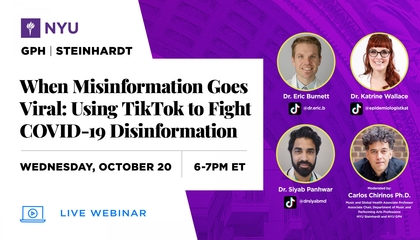As Americans stayed home during the COVID-19 lockdown, they spent more time than usual scrolling through social media to distract themselves from the uncertainty outside. Along with dance trends and funny cat videos, there was also a flood of misinformation about COVID-19 posted by everyday people, including uninformed opinions from doctors and alarmist coverage from news outlets about the virus.
In response to misinformation being spread to the public, some physicians on the frontlines took to social media on their own to dispel the most common myths about COVID-19 and the vaccine. At a recent GPH event hosted by music and global health associate professor Carlos Chirinos, three medical professionals who are also TikTok stars discussed their experiences combating misinformation on the app. Each one is currently working in a hospital or educational institution where information on the vaccine is constantly evolving.
In traditional social settings, when people have questions about a particular topic they defer to experts on that subject. However, the flood of information on the internet -- while giving us the tools to explore -- also enables people to pick and choose facts from a variety of different sources and interpret them as they see fit.
As Dr. Siyab Panhwar (@drsiyabmd), a board-certified internist and cardiology fellow at Tulane University, explained, the internet is both a benefit and a barrier to getting the right information to citizens who are not on the frontlines seeing the effects of the virus daily. “You used to defer to people who know more than you. But that doesn’t happen on social media -- everyone’s an expert,” he said.
Dr. Katrine Wallace, also known as “Kat the Epidemiologist” (@epidemiologistkat), is an assistant professor at the University of Illinois at Chicago. She reminded the audience that the best information that doctors can provide, in addition to their real-life experiences, is certified data that supports what they are seeing -- especially regarding the importance of getting vaccinated. “For every negative person there are ten people who say they watched our videos and got vaccinated, so that’s why I keep doing it,” said Dr. Wallace.
Dr. Eric Burnett (@dr.eric.b) is a hospitalist at Columbia-Presbyterian and assistant professor in clinical medicine at Columbia University. He said he downloaded TikTok to distract from the horrors of what was happening in the hospital, and wanted to counteract the rampant misinformation surrounding fake cures like ivermectin. “Misinformation is literally landing people in the hospital, literally killing people, so that’s why I do it,” he said.
Although the doctors agreed that it can be rewarding to provide clarity on COVID-19, having a prominent social media presence also has its drawbacks -- including threats to their own safety. Hate comments and inflammatory anti-vaccine rhetoric have led them to be cautious about how they present information on social media platforms like TikTok.
Each of them emphasized the importance of ensuring that the information they provide does not come off as antagonistic to those who have not yet made up their minds about getting the vaccine. Although it can be scary to present yourself on social media and receive hate comments, the doctors agreed that the positive outweighs the negative in the work they are doing for the public’s benefit.
